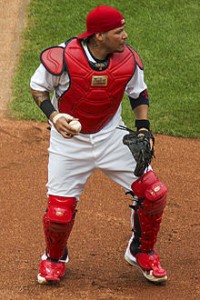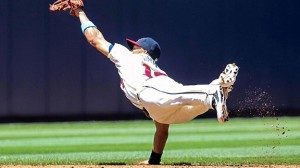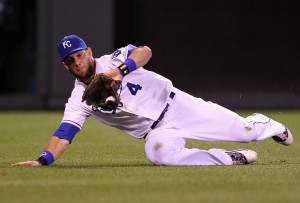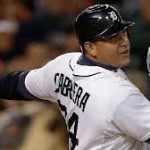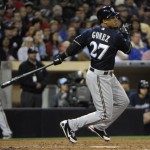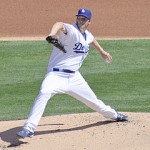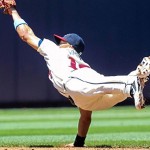The winners of the 2018 Gold Gloves were announced on 11/4/18 … and once again, there’s a slew of poor selections among the winners when you look at the league leaders of defensive metrics.
Here’s the 2018 Gold Glove Winners:
Of these 18 winners, I’ve got problems with at least 5 of them.
- Yadier Molina: wins his 9th Gold Glove, yet he was not the NL leader by any C statistical measure, nor was he the Fielding Bible catcher selection for 2018. Wilson Contreras was the NL leader in Fangraphs total defense stat and in Baseball-Reference’s Total Zone, while Jeff Mathis was the NL leader in DRS and FRAA. Molina actually posted a NEGATIVE DRS, and was ranked 11th in the NL among catchers with more than 500 innings (i.e. basically full time catchers). He posted the DRS figure as the Nationals’ Matt Wieters, who nobody in the majors is claiming to be a fine defensive catcher. This was clearly a “reputation selection” for a guy who yes at one time was inarguably the best defensive catcher in the sport, but who just played his age 35 year and has no business winning a Gold Glove over other more deserving candidates.
- DJ LeMahieu wins his third Gold Glove, yet was flatly outshined by the Cardinals’ Kolten Wong, who nearly swept the defensive metrics. Wong was the NL leader in Fangraphs total defense, UZR/150, and DRS, LeMahieu was the league leader in FRAA and Baseball Reference’s total Zone, which honestly are the two weakest defensive metrics. It isn’t that LeMahieu isn’t good: he was 2nd to Wong in the three categories Wong led … but the award should go to the winner. Wong was the Fielding Bible award winner for good reason.
- Jackie Bradley, Jr: wins his first Gold Glove, but was selected over an obvious candidate. Kevin Kiermaier may have only played 88 games this year, but in those 88 games he put up league-leading numbers in DRS. UZR/150 and Fangraphs total defense; imagine what he would have done in a full season. In fact, this seems to be the one thing working against Kiermaier (the 2016 Gold Glove winner): he missed out in both 2017 and 2018 thanks to not qualifying for the batting title (an odd statement for a fielding award). Bradley Jr. showed great range (he was near the league leaders in UZR) but actually had negative DRS. In the end, Bradley was probably the deserving choice of players who didn’t miss half the season, so my nits are slight here.
- Ender Inciarte: wins his 3rd GG, and this might also be a “reputation award” because the NL had at least two more deserving candidates. Lorenzo Cain was the Fielding Bible award winner, and led the NL in Fangraphs total Defense and DRS. Harrison Bader led the league in UZR/150 and FRAA. Inciarte was second to Cain across the board among qualified CFs … so why wasn’t he the winner?
- Nick Markakis wins his third GG … in somewhat of a “down year” for NL right fielders. Its hard to say who the deserving winner here was: Yasiel Puig led qualified (and all) RFs in DRS, Jason Heyward led in the two iffy stats FRAA and B-R’s total zone. Markakis posted just barely positive figures for both DRS and UZR/150, and there’s only 6 “qualified” RFs on the list … so I guess Markakis isn’t the worst possible choice. Bryce Harper, coincidentally, had an abhorrent year defensively. Which is really weird, because last year he posted BETTER numbers across the board than those that just won Markakis a Gold Glove. It almost makes you wonder if Harper wasn’t nursing yet another hidden injury all year. Or maybe he was just 100% disgruntled and not trying (he certainly hit like it) But I digress.
Here’s a series of tables showing the league leaders by various other fielding measures:
The Fielding Bible awards are a part stat, part committee-led selection process spearheaded by Bill James (yes the same Bill James who said that all players were replaceable. Great take for an employee of a MLB ball-club). And the Gold Glove awards managed to miss fully 1/3rd of the FB awardees this year.
This table is the Fangraphs Defense Runs Above Average stat, a combination of DRS and UZR that attempts to get the best of both worlds of the individual defense stats. DEF aligned the best with the GG Winners, matching up 56% of the time.
This table is the UZR/150 leaders. UZR is a range factor stat,normalized to 150 games to take out small sample sizes, and I’ve limited the leaders to those who played at least 500 innings this year at the position in question. Its not a counting stat so it can be skewed if a fleet-of-foot player makes a ton of flashy plays. Interestingly, UZR/150 did a great job predicting the AL gold glove winners … but did not align with a SINGLE NL winner. I also found it fascinating that the NL leader for left fielders was none other than Kyle Schwarber who has been frequently denigrated for his lack of defensive prowness. Well, stats don’t lie; maybe its time to re-think the Chicago slugger’s contributions.
This table shows league leaders in DRS; Defensive Runs Saved. Its a counting stat, so the more innings you play the more you can accumulate. And, its a contextually driven stat, which can result in some random skewing. For example; lets say you reach over the fence and catch a potential home run with the bases loaded; this results in 4 DRS. But all you did was make one fly ball catch of slight but not exceedingly extensive difficulty. This leads to some wild variations in DRS for some players. For example; Mike Trout (widely considered to be a fantastic CFer) has posted these full season DRS figures in his career: 21, -11, -12, 5, 6, -6 and 8 in 2018. So, who is Mike Trout the center fielder? Is he the guy who posted a 21 DRS in 2012 (an amazingly good figure), or the guy who posted consecutive seasons of -11 and -12 the next two years (pretty bad), or the guy who posted an 8 DRS in 2018 (good enough for 5th among qualified CFers, but just 12th in baseball among all CFers for the year and behind our own Michael A. Taylor, who put up 10 DRS in part time duty). I dunno. This is why you look at multiple defensive stats.
This table shows the Baseball Prospectus Fielding Runs Above Average, which tries to roll all the metrics and defensive contextualization into one stat. This stat routinely does the worst job predicting Gold Gloves; this year it matched up with just 4 of the 18 GG winners.
The last table here shows Baseball-Reference.com’s attempt at a defensive stat; one called Total Zone. They’re really hard to find on their main page, but they’re there. This stat tries to create a “runs above average” based on plays made combining the output of several other defensive rate stats. But something seems amiss with this stat: the three AL outfielder leaders for the FRAA defensive metric ALL played in Boston. Andrew Benintendi, Bradley and Betts swept the lead. Is there something weird about Fenway that lead FRAA to get skewed results or is this a coincidence? Might be a coincidence since Bradley and Betts are both league-best calibre defensive players, but its also worth noting that two of the three FRAA leaders in the NL outfield play in Pittsburgh. FRAA also wildly overrates Catcher defense; most of the guys in the top 20 are catchers.
I know defensive stats are not perfect. Which makes WAR figures imperfect as well. But they’re the best we have, and looking across all of them gives the best viewpoint into ranking and evaluating defenders. I just wish the people voting on these awards did the same.
